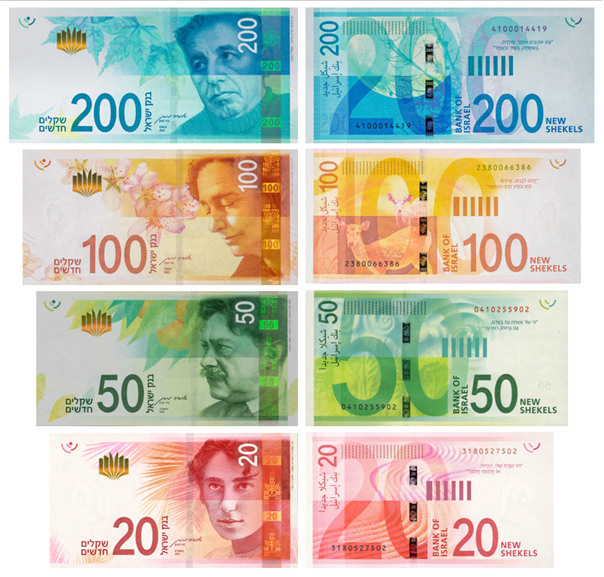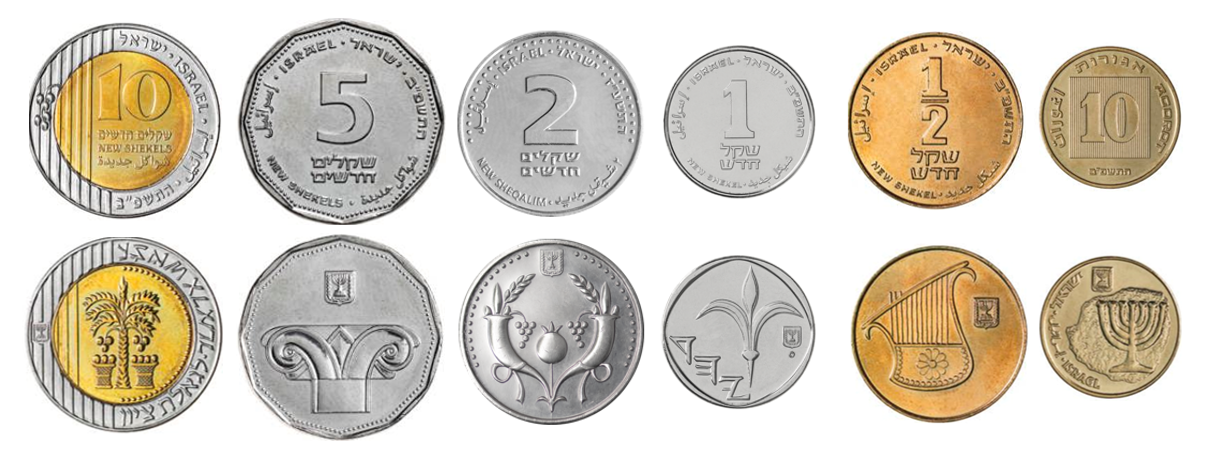Israel’s Currency
Important information to know about the Israeli currency before traveling to Israel
Where can I exchange Israeli shekels?
You can exchange Israeli shekels at various places for your convenience:
- Banks: Most banks provide currency exchange services. Look for major banks in urban areas.
- Post Office: You can find post offices in most cities and towns. You can spot them by their logo – a red galloping doe.
- Currency Exchange Offices: Found in tourist areas, airports, and city centers, these offices specialize in currency exchange.
- ATMs: Widely available, ATMs allow you to withdraw Israeli shekels directly using your debit or credit card.
- Hotels: Some hotels offer currency exchange services, but rates may not be as favorable.
Where can I get the best exchange rate in Israel?
The optimal exchange rate in Israel can fluctuate based on factors such as the time of year, location, and the sum of money being exchanged. Nevertheless, there are several general guidelines that can assist you in maximizing your currency exchange value.
Consider the following places for securing a favorable exchange rate in Israel:
- Banks: While banks are typically a secure and trustworthy option for currency exchange, it’s important to note that their rates may not always be the most competitive.
- Currency Exchange Bureaus: These bureaus, commonly situated in tourist areas, often provide competitive exchange rates. Nonetheless, it is advisable to compare rates across multiple bureaus before making a transaction.
- ATMs: ATMs can be a convenient method for withdrawing money in Israel. However, be mindful of potential fees, and check with your local bank for details. Generally, this is a convenient way to exchange money.
Additional tips for obtaining the best exchange rate in Israel:
- Exchange Larger Amounts: Larger transactions typically yield more favorable exchange rates.
- Compare Rates: Take the time to compare rates from various sources before finalizing your currency exchange.
- Inquire About Fees: Prior to exchanging money, inquire about any associated fees to ensure transparency.
- Avoid Airport Exchanges: Airports often offer less favorable exchange rates, so it’s advisable to avoid exchanging money there.
- Use Credit Cards: Whenever possible, opt to pay with a credit card. Credit cards typically provide up-to-date exchange rates and may not charge additional fees.
By considering these tips and choosing the right venue based on your specific needs, you can enhance the value of your currency exchange in Israel.
Should I get shekels before going to Israel?
Whether or not to exchange your currency for shekels before you travel to Israel depends on your preferences and travel style. It is recommended to have at least some cash when you get to Israel so not to use changes in the airport as they have the worst exchange rates.
Pros of exchanging currency before your trip:
- Better exchange rates: You may be able to get a better exchange rate if you exchange currency before you leave your home country. This is because banks and currency exchange bureaus often charge higher fees for exchanging currency at the airport or other tourist destinations.
- Convenience: It can be more convenient to have shekels already in your possession when you arrive in Israel. This will save you time and hassle, especially if you arrive late at night or on a weekend when currency exchange bureaus may be closed.
- Peace of mind: Exchanging currency before you leave can give you peace of mind knowing that you have the local currency on hand when you arrive. This can help you avoid the stress of trying to find an exchange bureau at the last minute.
Cons of exchanging currency before your trip:
- Currency fluctuations: The exchange rate can fluctuate, so you may not get the best rate if you exchange currency too far in advance of your trip.
- Additional fees: Some banks and currency exchange bureaus charge fees for exchanging currency. Make sure to factor in these fees when you’re budgeting for your trip.
Do stores in Israel accept other currencies?
Most shops in Israel accept the local currency only!!!
Some gift shops are tourist sites that may take other currencies too.
Images are based on images from Bank of Israel
Israeli Shekel Bills
Denominations: ₪20, ₪50, ₪100, ₪200
Design: Each bill showcases historical figures and symbols, reflecting Israel’s rich heritage.
Usage: Widely accepted for transactions, from markets to restaurants.
Exchange: Easily exchangeable at banks, currency offices, or ATMs.
As you can see in the image the bills are not the same length. By making the bills different sizes, people who are blind or have low vision can more easily count their money and avoid making mistakes.
Coins image are based on images from Bank of Israel and are at relative scale to each other
Israeli Shekel Coins
Denominations: ₪1, ₪2, ₪5, ₪10, 10 Agorot, 50 Agorot.
1 Israel Shekel contains 100 Agorot
Usage: Common for daily transactions, especially in markets and smaller establishments.
Design: Each coin features symbols like the menorah, lyre, and lily, representing cultural and historical elements.
Availability: ATMs dispense coins, and they’re easily obtainable in everyday transactions.
Value: Familiarize yourself with the value of each coin for efficient use.
Collectibles: Some coins may have special editions or designs, making for unique souvenirs.
Credit Cards
Credit cards, including Visa, MasterCard, Diners Club, Access, Eurocard, and American Express, are widely accepted in Israel. You can use them to withdraw cash from ATMs using your PIN. However, note that some smaller businesses and open-market vendors may only accept cash, so it’s recommended to carry some with you during your travels. Among credit cards, MasterCard and Visa are the most commonly welcomed in Israel.
Current Exchange rates to NIS
Bank of Israel list of exchange rates
Israeli Shekel Currency Calculator
What is the difference between NIS and ILS currency?
The terms “NIS” (New Israeli Shekel) and “ILS” (Israeli Shekel) are essentially interchangeable and refer to the same currency used in Israel. The official ISO currency code for the Israeli Shekel is ILS, while NIS is the common abbreviation used in Israel.
The confusion arises because, historically, the Israeli currency underwent a transition. Before the introduction of the New Israeli Shekel (NIS) in 1985, the currency was known simply as the Israeli Shekel (ILS). The decision to introduce the “New” designation was made to signify a redenomination of the currency, during which several zeros were removed to simplify transactions.
Since the introduction of the New Israeli Shekel in 1985, both “NIS” and “ILS” have been used to refer to the Israeli currency. It’s common to see prices, financial news, and official documents using either term. In practical terms, whether you see NIS or ILS, it still refers to the same currency, and there is no difference in their value or use.
What is the symbol of the Israeli Currency?
The official symbol for the New Israeli Shekel (NIS) is ₪. This symbol represents the currency in a concise and recognizable way, making it easier for people to identify and use in financial contexts. The symbol is a stylized combination of the Hebrew letters “נ” (Nun) and “ש” (Shin), which are the first letters of the words “New Shekel” in Hebrew. The design reflects the cultural and linguistic aspects of Israel, providing a unique and meaningful representation of the currency. The use of symbols helps facilitate international transactions and contributes to the distinct identity of the currency.





